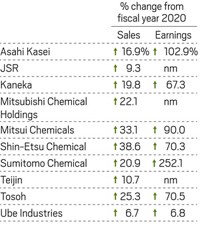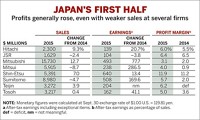Advertisement
Grab your lab coat. Let's get started
Welcome!
Welcome!
Create an account below to get 6 C&EN articles per month, receive newsletters and more - all free.
It seems this is your first time logging in online. Please enter the following information to continue.
As an ACS member you automatically get access to this site. All we need is few more details to create your reading experience.
Not you? Sign in with a different account.
Not you? Sign in with a different account.
ERROR 1
ERROR 1
ERROR 2
ERROR 2
ERROR 2
ERROR 2
ERROR 2
Password and Confirm password must match.
If you have an ACS member number, please enter it here so we can link this account to your membership. (optional)
ERROR 2
ACS values your privacy. By submitting your information, you are gaining access to C&EN and subscribing to our weekly newsletter. We use the information you provide to make your reading experience better, and we will never sell your data to third party members.
Business
Slow Growing Asia
Asian countries will see growth, but less than they experienced in 2011
by Jean-François Tremblay
January 12, 2012
| A version of this story appeared in
Volume 90, Issue 2

Someone visiting almost any Asian country from Europe or the U.S. would conclude that the local economy is firing on all cylinders. But by Asian standards, a slow-down is under way that is affecting commodity chemicals.
COVER STORY
ASIA Economic growth in most countries will slip this year
The slowdown is most obvious in China, a major importer of chemicals and Asia’s largest economy. True, China’s economy is likely to expand 8.8% in 2012, according to the Asian Development Bank. But that number is lower than the 9.3% growth that China saw in 2011 or the 10.4% leap in 2010.
According to Yoshihiro Azuma, a stock analyst at the investment firm Jefferies, the Chinese construction sector will slow in 2012, regardless of government policies, because the country overbuilt during the past two years. Thus, Chinese demand for vinyls, polyurethanes, and phenol derivatives will be weak this year, Azuma predicts in a research note.
Unlike China, the Japanese economy will perform better in 2012 than it did last year. In March 2011, of course, Japan experienced the Great East Japan Earthquake, which led to a slight economic contraction. Public and private reconstruction spending will drive growth in 2012, according to the Organization for Economic Cooperation & Development.
Yet Japanese chemical companies aren’t optimistic. When Sumitomo Chemical announced financial results two months ago, it anticipated deterioration in earnings over the coming months, largely because of slower demand for electronic materials. Shin-Etsu Chemical says it expects a “severe business situation” in Japan because of rising unemployment and deflation.
India remains a bright spot, but according to a December report from the investment bank Morgan Stanley, growth prospects there are extremely fragile.
Morgan Stanley expects falling tax income to force the Indian government to reduce subsidies to households. In addition, the bank says Indian growth in personal consumption will moderate because inflation is eroding purchasing power. The Reserve Bank of India estimates that inflation currently exceeds 9%. In its latest financial results, released in October, India’s Reliance Industries said demand for polymers had gone flat.





Join the conversation
Contact the reporter
Submit a Letter to the Editor for publication
Engage with us on Twitter